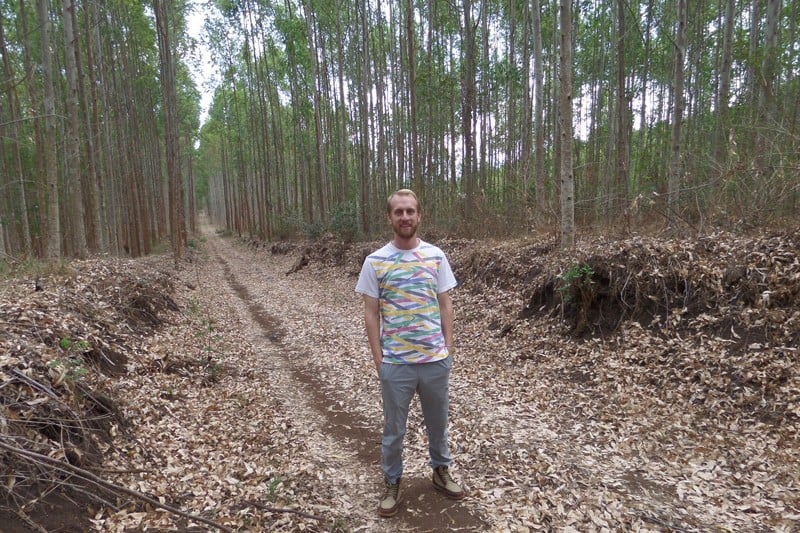RESEARCH
DISCOVERY
A Blog Devoted to UD Innovation, Excellence & Scholarship
ENVIRONMENT
Tropical forest loss
New UD study shows that tropical forest loss is increased by large-scale land acquisitions
UD Assistant Professor Kyle Davis has published a new study that looks at which types of large-scale land investments may be associated with increases in tropical deforestation. Davis is pictured here doing fieldwork in central Mozambique when members of the research group were visiting forest concessions and large-scale agricultural investments. This particular photo is from inside a Eucalyptus plantation.
In recent years, there has been a rise in foreign and domestic large-scale land acquisitions—defined as being at least roughly one square mile—in Latin America, Asia, and Africa where investing countries and multinational investors take out long-term contracts to use the land for various enterprises.
In some cases, this leads to the creation of new jobs for local communities, and governments often welcome these investments as a means to promote the transfer of technologies and the inflow of capital. But the investments can also have adverse outcomes for local people, who rely on the acquired areas for food and income but have no legal claim to the land, and the environment— as the land will likely need to be converted to serve its intended use.
An international group of researchers led by the University of Delaware’s Kyle Davis has recently published a study in Nature Geoscience to see which types of large-scale land investments may be associated with increases in tropical deforestation. They found that investment types focusing on establishing new tree plantations — where an area is cleared of existing trees and planted with a single tree species that is harvested for timber — as well as plantations for producing palm oil and wood fiber, consistently had higher rates of forest loss than surrounding non-investment areas.
The study’s findings show that large-scale land acquisitions can lead to elevated deforestation of tropical forests and highlight the role of local policies in the sustainable management of these ecosystems.
Analyzing land deals, forest cover
Researchers used a georeferenced database of more than 82,000 land deals — covering 15 countries in Latin American, sub-Saharan Africa and Southeast Asia — with global data on annual forest cover and loss between 2000 and 2018.
They found that since the start of the century, 76% of all large-scale land acquisitions in the Global South — an emerging term which refers to the regions of Latin America, Asia, Africa and Oceania — can be attributed to foreign land investment. These land acquisitions covered anywhere from 6% to 59% of a particular country’s land area and 2% to 79% of its forests.
The information came from the Global Forest Watch database run by the World Resources Institute as well as other sources such as government ministries, which provides information for thousands of individual investments that show the exact area, boundary and intended use.
“This collection of datasets on individual land investments provided me with information on the exact area, boundary, and intended use of each deal. I then combined these data with satellite information on forest cover and forest loss to understand whether large-scale land investments are associated with increased rates of forest loss,” said Davis, assistant professor in the Department of Geography and Spatial Sciences in UD’s College of Earth, Ocean and Environment and the Department of Plant and Soil Sciences in UD’s College of Agriculture and Natural Resources.






